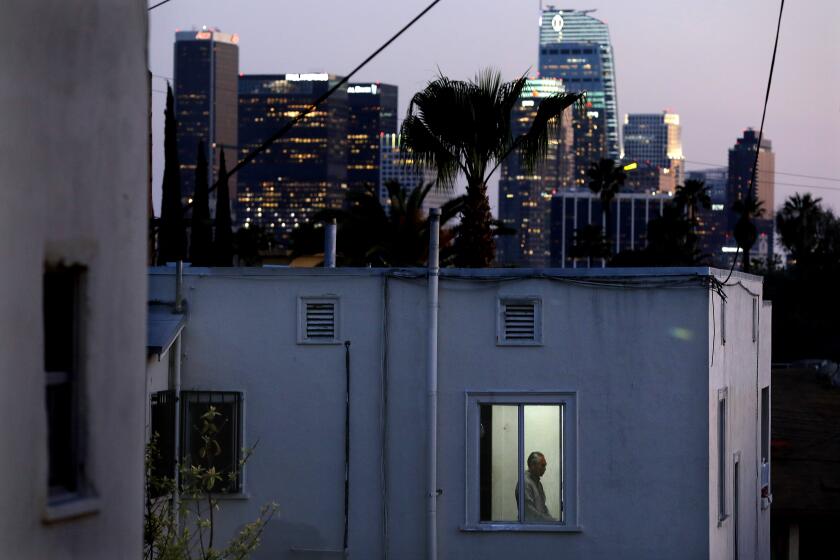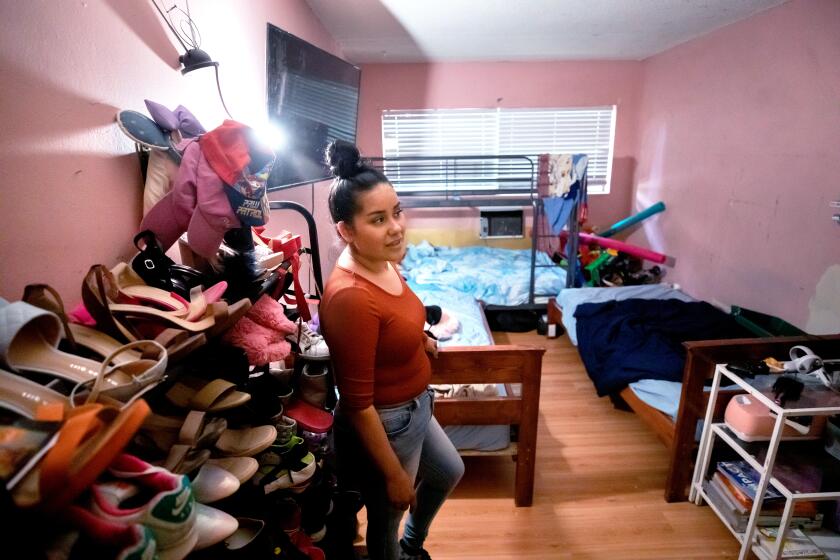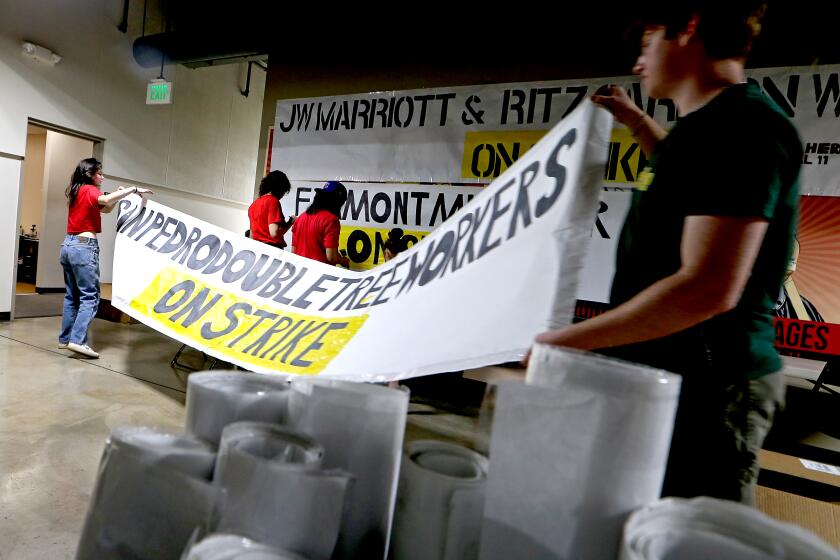See which California counties are the most expensive for renters in the U.S.

- Share via
Minimum-wage workers shouldn’t bother trying to find a two-bedroom apartment — anywhere in the U.S.
According to a new federal report, “in no state, metropolitan area, or county in the U.S. can a worker earning the federal or prevailing state or local minimum wage afford a modest two-bedroom rental home at fair market rent by working a standard 40-hour work week.”
The “Out of Reach” report reveals in stark terms the financial challenges facing renters, particularly in California.
A California renter needs to make $42.25 an hour to afford a two-bedroom rental unit, the highest figure in the nation, according to the new study. The mean hourly wage for California renters, by contrast, is only $33.67.
As the L.A. rental market soars out of reach for many working families, one community wants to hold on to its low-cost housing.
Hawaii, Massachusetts, New York and Washington were the next four most expensive states after California, with renters needing to make at least $35 hourly to afford a two-bedroom apartment.
In California, 33-year-old Cristian Morales offers an example of the struggle facing hourly wage earners to secure decent housing.
He makes $21 an hour as a laundry attendant at the Hilton Pasadena. The job, which he has held for nearly five years, can be stressful. “We have to be moving all the time,” he said, “and sometimes there’s not time to get our 10-minute breaks.”
The hotel is frequently short-staffed, Morales said, which sometimes means that a 14-story chute becomes packed with linens “all the way to the sixth floor” before he can get to it.
Along with his wife and five children, Morales lived in a rental apartment in North Hills until 2020, when they could no longer afford the apartment. “Rent in L.A. went up,” he said. “It’s super up. Groceries are up.”
The family moved in with Morales’ in-laws in Baldwin Park, where three of the kids live in the front house, with their grandparents and the rest of the family living in the back house.
“Of course, I want my own place,” Morales said. “It’s not the same living with your father- and mother-in-law.”
The eight most expensive counties for renters in America were all in California, including Santa Barbara and Orange counties in Southern California, according to the report from the National Low Income Housing Coalition.
In the four most expensive counties — Santa Cruz, Marin, San Francisco and San Mateo — a renter needs to make more than $60 an hour to afford a two-bedroom unit.
Santa Cruz County, where the mean renter income was estimated at $22.39 an hour, had the biggest discrepancy between actual income and the income required to afford a two-bedroom. The mean renter only made 34% of the income necessary to afford such a unit, according to the study.
New census data reveals over a quarter of U.S. households had solo occupants in 2020, more than three times the 1940 estimate and more than twice the 1960 level.
“The affordable housing crisis worsened over the past few years as the COVID-19 pandemic, unusually low housing vacancy rates, skyrocketing rental prices and record-breaking inflation exacerbated the financial insecurity of low-income renters,” the report states.
California is the most renter-heavy state in the U.S., with 45% of housing units occupied by renters. Within the state, Los Angeles and San Francisco counties, where the rates are 62% and 54%, respectively, stand out.
Apartment owners are also speaking out about rents.
“We have been screaming for years and years that the lack of supply and construction of new housing is leading to this increase,” said Fred Sutton, a spokesperson for the California Apartment Assn., a group representing the rental housing industry.
“The costs of operating housing have skyrocketed over the last several years,” he said, noting that rent control, inflation and operating costs are factors in adjusting rents.
“Housing is becoming more and more scarce in the state, and some of the local municipalities have made it ever-increasingly harder to obtain,” Sutton said. He argued for reduced regulations on housing construction.
In all but three of California’s 58 counties, the mean wage for renters was not enough to afford a two-bedroom rental. The three counties where wages were high enough were all high-rent locales in the Bay Area: San Francisco, Santa Clara and San Mateo.
Unionized hotel workers reach deal with biggest employer on eve of July 4 weekend and planned strike
As Los Angeles and Orange counties brace for the largest U.S. hotel worker strike in recent memory, one downtown L.A. hotel has struck a tentative deal with the union representing its employees.
The report states that “renters are facing the effects of a long-standing trend in which rents have risen faster than wages.” Between 2001 and 2021, according to the report, median rents increased 17.9%, while median household income went up 3.2%.
In Arkansas, the nation’s cheapest state for renters, a renter can afford a two-bedroom unit with an hourly income of $16.27. That’s about one-third of the cost in California.
The Dakotas, Mississippi and West Virginia, all with hourly wages between $16 and $18, rounded out the five least expensive states. Minimum wages in all five states are far below California’s $15.50 rate: Arkansas’ is the highest, at $11, and North Dakota and Mississippi are the lowest, benchmarked to the federal level of $7.25.
For Morales, affordable housing for his family is a pipe dream. “In reality, we checked about a year ago, but it’s too expensive. It’s not like we can move to a single — I’ve got five kids.
“It’s super hard to even find a place that we can all fit and have a little freedom,” he said.
Higher wages could make a difference. Morales belongs to the Unite Here Local 11 hotel workers’ union, and plans to go on strike this weekend alongside thousands of otherscalling for higher wages.
“We’re ready, we’re motivated, and we believe that we deserve what we’re asking for,” he said.
More to Read
Sign up for Essential California
The most important California stories and recommendations in your inbox every morning.
You may occasionally receive promotional content from the Los Angeles Times.














